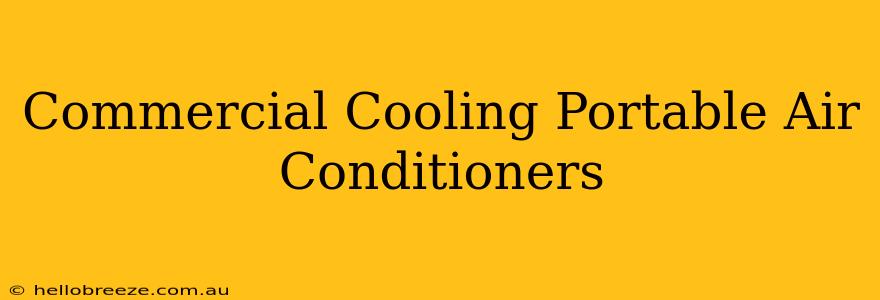Staying cool in a commercial setting is crucial for productivity and comfort. Portable air conditioners offer a flexible and cost-effective solution for businesses of all sizes, providing targeted cooling where you need it most. This guide explores the world of commercial cooling portable air conditioners, helping you choose the right unit for your specific needs.
Understanding Your Cooling Needs
Before diving into specific models, it's essential to assess your cooling requirements. Several factors influence the choice of a portable air conditioner:
- Square Footage: The size of the space you need to cool directly impacts the BTU (British Thermal Unit) rating required. Larger spaces necessitate higher BTU units for effective cooling. Underestimating BTU needs is a common mistake, leading to inefficient cooling.
- Climate: Your local climate and average temperatures influence the cooling capacity needed. Hotter climates require more powerful units.
- Insulation: Well-insulated spaces require less cooling power than poorly insulated ones. Consider your building's insulation level when determining BTU requirements.
- Occupancy: The number of people in the space impacts the cooling load. More occupants mean a higher BTU rating is necessary.
- Heat Sources: Consider any heat-generating equipment or machinery within the space, like computers or industrial equipment. This adds to the cooling demand.
Types of Commercial Portable Air Conditioners
Commercial portable AC units come in various types, each suited to different needs:
- Window Units: These are relatively inexpensive and straightforward to install. However, they're only suitable for spaces with appropriate windows.
- Through-the-Wall Units: Offer similar cooling to window units but are more discreet and secure. They require wall installation.
- Split Units: These offer better cooling efficiency and quieter operation than single-unit portable ACs. They comprise two units: an indoor unit and an outdoor condenser. They are a superior option for consistent and powerful cooling.
- Multi-Room Units: Some portable systems can manage multiple zones simultaneously, ideal for larger commercial spaces needing zoned cooling.
Key Features to Consider
When selecting a commercial cooling portable air conditioner, look for these important features:
- BTU Rating: As mentioned, this is crucial for determining the unit's cooling capacity. Select a unit with a BTU rating appropriate for the space's size and heat load.
- Energy Efficiency (SEER Rating): The Seasonal Energy Efficiency Ratio (SEER) indicates how efficiently the unit uses energy. Higher SEER ratings mean lower energy bills. Prioritize high SEER ratings for long-term cost savings.
- Noise Level: Noise can be disruptive in a commercial environment. Look for units with low noise levels, particularly if placed in quiet areas.
- Ease of Installation and Maintenance: Consider the ease of installation and the accessibility of components for maintenance.
- Durability and Reliability: Opt for a unit from a reputable manufacturer with a good track record of reliability.
- Smart Features: Some models offer smart features like remote control via smartphone apps, programmable timers, and self-diagnostic capabilities.
Choosing the Right Portable AC for Your Business
Selecting the ideal commercial cooling portable air conditioner involves careful consideration of your specific needs. Begin by accurately assessing your space’s cooling requirements. Then, compare different types and models based on factors like BTU rating, energy efficiency, and features. Investing in a high-quality unit ensures optimal cooling, comfort, and long-term cost-effectiveness. Consult with an HVAC professional if you have any doubts or need expert advice.
Maintenance and Care for Your Portable AC Unit
Regular maintenance is crucial to extend the life and efficiency of your portable air conditioner. This includes:
- Regular Cleaning: Clean filters regularly to ensure optimal airflow and performance.
- Coil Cleaning: Clean the condenser coils to prevent dust buildup that can reduce efficiency.
- Professional Servicing: Consider having your unit serviced annually by a qualified technician.
By following these tips, you can keep your commercial cooling system running smoothly and efficiently for years to come. Proper maintenance translates directly to lower energy costs and improved performance. Don't overlook the importance of regular upkeep!
Remember to always consult with a professional HVAC technician for installation and maintenance of any commercial cooling system. They can assess your specific needs and recommend the most appropriate solution.

